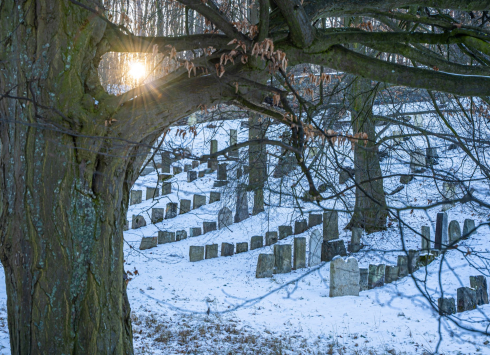
Jews in Vysočina
 Jews have been coming to the Vysočina region since the early Middle Ages. They settled in places of important markets, at the crossroads of long-distance trade routes and in the vicinity of noble residences. The oldest mention of Jewish settlement in the Jihlava area dates back to 1345, when there were nine Jewish communities, including Jihlava, Batelov, Brtnice, Polná, Telč and Větrný Jeníkov. Until the Hussite wars the Jews lived relatively peacefully, although they suffered many financial losses caused by the cancellation of bonds, but the feared disasters were avoided. However, after 1451 they were expelled from all royal towns under various pretexts and so they went to neighbouring towns and villages, laying the foundations for the local Jewish communities there. It was only during the second half of the 18th century that for a fee Jews were granted the right of residence, were allowed to study at schools and practice trades. At that time, six Jewish communities were registered, including Třebíč and Velké Meziříčí. It was not until the "Josephine reforms" of 1846 that they became free.
Jews have been coming to the Vysočina region since the early Middle Ages. They settled in places of important markets, at the crossroads of long-distance trade routes and in the vicinity of noble residences. The oldest mention of Jewish settlement in the Jihlava area dates back to 1345, when there were nine Jewish communities, including Jihlava, Batelov, Brtnice, Polná, Telč and Větrný Jeníkov. Until the Hussite wars the Jews lived relatively peacefully, although they suffered many financial losses caused by the cancellation of bonds, but the feared disasters were avoided. However, after 1451 they were expelled from all royal towns under various pretexts and so they went to neighbouring towns and villages, laying the foundations for the local Jewish communities there. It was only during the second half of the 18th century that for a fee Jews were granted the right of residence, were allowed to study at schools and practice trades. At that time, six Jewish communities were registered, including Třebíč and Velké Meziříčí. It was not until the "Josephine reforms" of 1846 that they became free.
At the end of the century thirty settlements existed in Vysočina. However, further development was interrupted by the Nazi occupation, 1942 and the Holocaust.
In various places in the Vysočina region we can see the remnants of Jewish settlement - individual houses, town quarters and synagogues. In many towns, much attention is paid to their reconstruction, and although the synagogues do not serve their original purpose, they are open to the public as exhibition spaces or concert venues. However, as a result of the insensitive approach of the past decades, Jewish cemeteries remain the only monument in many places.
JEWISH MONUMENTS
In many places in Vysočina we can still find monuments commemorating the history of Jewish settlement - Jewish prayer houses, synagogues, cemeteries or parts of villages. Much attention is paid to their restoration in many towns, even though the synagogues no longer serve their original purpose, they are open to the public as exhibition spaces or concert venues. However, as a result of the insensitive approach of the past decades, Jewish cemeteries remain the only monument in many places.
Jews in Vysočina


REAR SYNAGOGUE TŘEBÍČ

HOŘEPNÍK JEWISH CEMETERY

HUMPOLEC SYNAGOGUE

BATELOV JEWISH QUARTER

BATELOV SYNAGOGUE

BRTNICE JEWISH QUARTER

ČERNOVICE JEWISH QUARTER

CHOTĚBOŘ JEWISH CEMETERY

GOLČŮV JENÍKOV JEWISH CEMETERY

GOLČŮV JENÍKOV JEWISH QUARTER

GOLČŮV JENÍKOV SYNAGOGUE

HABRY JEWISH CEMETERY

HORNÍ CEREKEV JEWISH CEMETERY

JEMNICE JEWISH CEMETERY

JEMNICE JEWISH QUARTER

Jewish cemetery - typhus Havlíčkův Brod

JIHLAVA JEWISH CEMETERY

JIHLAVA JEWISH QUARTER
















